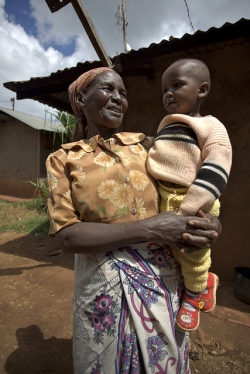 There is a potentially exciting development on the horizon for older people in Kenya!
There is a potentially exciting development on the horizon for older people in Kenya!
A motion brought to the Kenyan parliament could see more than 1.8 million older Kenyans above the age of 60 receiving a monthly non-contributory pension of 2,000 Kenyan Shillings (23 USD).
This is particularly important as most older people have no regular income. Most work in the informal sector and are excluded from contributory pension schemes. In sub-Saharan Africa, less than 19% of the older population has a contributory pension. Non-contributory pensions will help bridge this gap.
Huge impact on children’s lives
Older people are often disproportionately affected by poverty. Households where older people care for children orphaned by AIDS are even more prone to poverty. Of the estimated 1.2 million orphaned and vulnerable children in Kenya, at least 40% are looked after by older carers.
Should parliament pass this motion, the non-contributory pensions will have a huge impact on children’s lives in Kenya. It will significantly contribute to achieving the Millennium Development Goals and national development targets.
Pensions can reduce dependency
Rather than creating dependency, non-contributory pensions can actually reduce it. In addition to reducing demands on older carers, non-contributory pensions help people living with HIV and AIDS access treatment, which makes it easier for people to work and reduces the numbers of orphans.
Studies conducted have shown that governments and donors can afford non-contributory pensions. Depending on the size of the transfer and the number of eligible people, costs range from 0.03 to 2% of GDP.
The right to an adequate standard of living
The right to social security and an adequate standard of living is enshrined in the new Constitution of Kenya, as well as the Universal Declaration of Human Rights.
Additionally, this move is in line with international political commitments such as the Madrid International Plan of Action on Ageing 2002, as well as other regional agreements. They recommend a minimum package of essential health care, benefits for children, informal workers, the unemployed, older people and people with disabilities.
Hopefully, Kenya’s parliament will join the handful of African nations, such as South Africa, Lesotho, Swaziland, Namibia, Botswana and Mauritius that are one step ahead by providing a regular income to their older population.
Read more about our work on non-contributory pensions and with older people in Kenya
